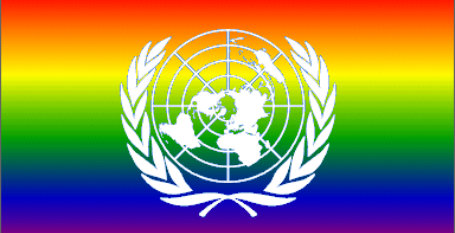Asia was one of two continents from where countries abstained, supported and opposed a recent United Nations Human Rights Council to address violence and discrimination based on gender identity and sexual orientation.
The resolution was passed Sept 26 in a 25–14 vote that calls for the U.N. high commissioner for human rights to update a 2012 report on LGBT rights violations and propose practices to combat them. Seven countries abstained. The resolution as a largely symbolic as it doesn’t outline any enforcement capability. Nonetheless this is only the second time the U.N. has affirmed that LGBT rights are “human rights.”
Asia was one of two continents from where countries abstained, supported and opposed the resolution. The only other continent that had countries in all three categories was Africa.
Japan, Philippines, Republic of Korea, and Vietnam in Asia were states that supported the resolution. China, Kazakhstan and India abstained. Indonesia, Kuwait, Maldives, Pakistan, Saudi Arabia and United Arab Emirates were Asian states that opposed the resolution.
The 14 nations that opposed the resolution included Muslim Asian countries. Those in favor of the resolution included Western and Latin American nations, as well as South Africa, the Philippines and Vietnam.
“We feel there is an attempt to impose uniculturality [that] runs counter to religious and cultural practices of some countries,” Saudi Arabia’s representative said during the session. “In my opinion, this [resolution] is a human rights violation.”
Countries that opposed the resolution tried to use procedural moves to scuttle the resolution and strip it of any significance by removing all references to sexual orientation and gender identity.
However, the resolution dismissed cultural specificity to justify states allowing anti-gay policies. “While the significance of national and regional particularities and various historical, cultural and religious backgrounds must be borne in mind, it is the duty of states, regardless of their political, economic and cultural systems, to promote and protect all human rights and fundamental freedoms,” it said.
The resolution was passed Sept 26 in a 25–14 vote that calls for the U.N. high commissioner for human rights to update a 2012 report on LGBT rights violations and propose practices to combat them. Seven countries abstained. The resolution as a largely symbolic as it doesn’t outline any enforcement capability. Nonetheless this is only the second time the U.N. has affirmed that LGBT rights are “human rights.”
Asia was one of two continents from where countries abstained, supported and opposed the resolution. The only other continent that had countries in all three categories was Africa.
Japan, Philippines, Republic of Korea, and Vietnam in Asia were states that supported the resolution. China, Kazakhstan and India abstained. Indonesia, Kuwait, Maldives, Pakistan, Saudi Arabia and United Arab Emirates were Asian states that opposed the resolution.
The 14 nations that opposed the resolution included Muslim Asian countries. Those in favor of the resolution included Western and Latin American nations, as well as South Africa, the Philippines and Vietnam.
“We feel there is an attempt to impose uniculturality [that] runs counter to religious and cultural practices of some countries,” Saudi Arabia’s representative said during the session. “In my opinion, this [resolution] is a human rights violation.”
Countries that opposed the resolution tried to use procedural moves to scuttle the resolution and strip it of any significance by removing all references to sexual orientation and gender identity.
However, the resolution dismissed cultural specificity to justify states allowing anti-gay policies. “While the significance of national and regional particularities and various historical, cultural and religious backgrounds must be borne in mind, it is the duty of states, regardless of their political, economic and cultural systems, to promote and protect all human rights and fundamental freedoms,” it said.












 列印版本
列印版本




















讀者回應
Moreover, I have to wonder how these oppositions would feel if the situation were reversed(ie, Muslims being deprived their rights, etc) and if they would be so adamant against such a resolution were that the case.
It really is frustrating to see some of these nations continue to think in their archaic mindsets.
Human Rights Council
AFTERNOON
26 September 2014
Action on Resolution on Human Rights, Sexual Orientation and Gender Identity
In a resolution (A/HRC/27/L.27/Rev.1) on human rights, sexual orientation and gender identity, adopted by a vote of 25 in favour, 14 against and seven abstentions, the Council takes note with appreciation of the report of the United Nations High Commissioner for Human Rights entitled “Discriminatory laws and practices and acts of violence against individuals based on their sexual orientation and gender identity” (A/HRC/19/41) and of the panel discussion held at the nineteenth session of the Human Rights Council; requests the High Commissioner to update the report (A/HRC/19/41) with a view to sharing good practices and ways to overcome violence and discrimination, in application of existing international human rights law and standards, and to present it to the Human Rights Council at its twenty-ninth session; and decides to remain seized of this issue.
The result of the vote was as follows:
In favour (25): Argentina, Austria, Brazil, Chile, Costa Rica, Cuba, Czech Republic, Estonia, France, Germany, Ireland, Italy, Japan, Mexico, Montenegro, Peru, Philippines, Republic of Korea, Romania, South Africa, The former Yugoslav Republic of Macedonia,
United Kingdom, United States of America, Venezuela and Viet Nam.
Against (14): Algeria, Botswana, Côte d’Ivoire, Ethiopia, Gabon, Indonesia, Kenya, Kuwait, Maldives, Morocco, Pakistan, Russian Federation, Saudi Arabia, and United Arab Emirates.
Abstentions (7): Burkina Faso, China, Congo, India, Kazakhstan, Namibia, and Sierra Leone.
-Glad to see Malaysia was not part of the vote !
-Where was Australia ?
請先登入再使用此功能。